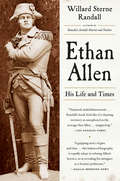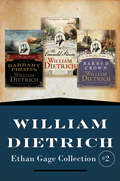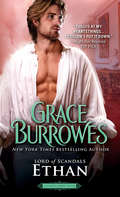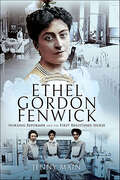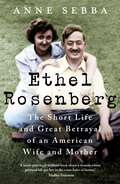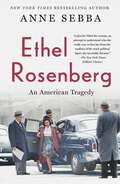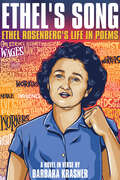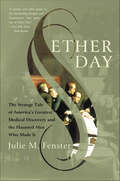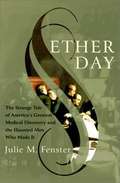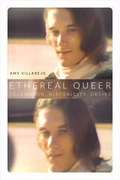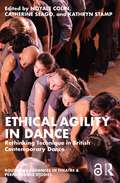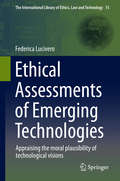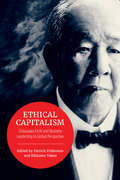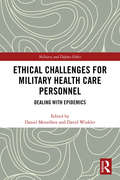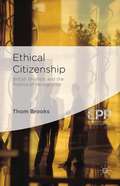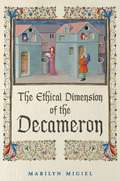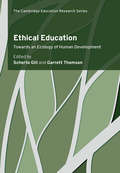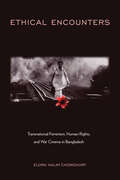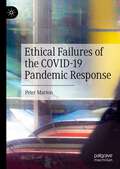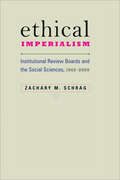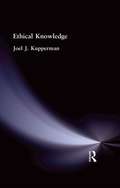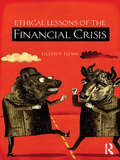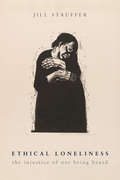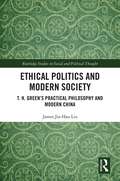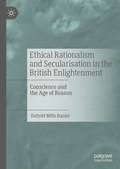- Table View
- List View
Ethan Allen: His Life and Times
by Willard Sterne RandallThe long-awaited biography of the frontier Founding Father whose heroic actions and neglected writings inspired an entire generation from Paine to Madison. On May 10, 1775, in the storm-tossed hours after midnight, Ethan Allen, the Revolutionary firebrand, was poised for attack. With only two boatloads of his scraggly band of Vermont volunteers having made it across the wind-whipped waters of Lake Champlain, he was waiting for the rest of his Green Mountain boys to arrive. But with the protective darkness quickly fading, Allen determined that he hold off no longer. While Ethan Allen, a canonical hero of the American Revolution, has always been defined by his daring, predawn attack on the British-controlled Fort Ticonderoga, Willard Sterne Randall, the author of Benedict Arnold, now challenges our conventional understanding of this largely unexamined Founding Father. Widening the scope of his inquiry beyond the Revolutionary War, Randall traces Allen's beginning back to his modest origins in Connecticut, where he was born in 1738. Largely self-educated, emerging from a relatively impoverished background, Allen demonstrated his deeply rebellious nature early on through his attraction to Deism, his dramatic defense of smallpox vaccinations, and his early support of separation of church and state. Chronicling Allen's upward struggle from precocious, if not unruly, adolescent to commander of the largest American paramilitary force on the eve of the Revolution, Randall unlocks a trove of new source material, particularly evident in his gripping portrait of Allen as a British prisoner-of-war. While the biography reacquaints readers with the familiar details of Allen's life--his capture during the aborted American invasion of Canada, his philosophical works that influenced Thomas Paine, his seminal role in gaining Vermont statehood, his stirring funeral in 1789--Randall documents that so much of what we know of Allen is mere myth, historical folklore that people have handed down, as if Allen were Paul Bunyan. As Randall reveals, Ethan Allen, a so-called Robin Hood in the eyes of his dispossessed Green Mountain settlers, aggrandized, and unabashedly so, the holdings of his own family, a fact that is glossed over in previous accounts, embellishing his own best-selling prisoner-of-war narrative as well. He emerges not only as a public-spirited leader but as a self-interested individual, often no less rapacious than his archenemies, the New York land barons of the Hudson and Mohawk Valleys. As John E. Ferling comments, "Randall has stripped away the myths to provide as accurate an account of Allen's life as will ever be written." The keen insights that he produces shed new light, not only on this most enigmatic of Founding Fathers, but on today's descendants of the Green Mountain Boys, whose own political disenfranchisement resonates now more than ever.
Ethan: Lord of Scandals
by Grace BurrowesEthan Grey's life was shattered... Estranged from his family, widowed after an unhappy marriage, and weary from fighting his troubled past, Ethan Grey now has a chance for redemption. His son's beautiful and remarkable governess might help him battle his ghosts, but it's been a long time since he let himself get close to anyone. Alice Portman has more in common with Ethan than she can comfortably admit. For now, she's satisfied with helping him rebuild his life and family. But the dangerous past is about to catch up with them both. An unforgettable Regency tale of two wounded people who get another chance at love. Award-winning New York Times and USA Today bestselling author Grace Burrowes's extraordinary writing will immerse you in a Regency world unlike any you've experienced.The Lonely Lords series:Darius (Book 1) Beckman (Book 2) Ethan (Book 3) Nicholas (Book 4) Gabriel (Book 5) Gareth (Book 6) Andrew (Book 7) Douglas (Book 8) David (Book 9)
Ethel Gordon Fenwick: Nursing Reformer and the First Registered Nurse (Trailblazing Women)
by Jenny MainA great nursing reformer, Ethel Gordon Fenwick was born before the age of the motor car and died at the start of the jet age. When she began her career, nursing was a vocation, unregulated with a dangerous variety of standards and inefficiencies. A gifted nurse, Ethel worked alongside great medical men of the day and, aged 24, she became the youngest matron of St Bartholomew’s hospital London, where she instigated many improvements. At that time, anyone could be called a nurse, regardless of ability. Ethel recognized that for the safety of patients, and of nurses, there must be an accepted standard of training, with proof of qualification provided by a professional register. Often contentious, Ethel was a determined woman. She fought for nearly thirty years to achieve a register to ensure nurses were qualified, respected professionals. A suffragist and journalist, she travelled to America where she met like-minded nursing colleagues. As well as helping to create the International Council of Nurses, and the Royal British Nurses Association, she was also instrumental in organising nurses and supplies during the Graeco-Turkish War, and was awarded several medals for this work. Thanks to her long campaign for registration, a year after her death nurses were ready to take their place alongside other professionals when the National Health Service began in 1948.
Ethel Rosenberg: A Cold War Tragedy
by Anne Sebba"Totally riveting. I couldn't put it down" VICTORIA HISLOP"Masterful, original and painfully gripping" PHILIPPE SANDS"A heart-piercingly brilliant book about a woman whose personal life put her in the cross-hairs of history" HADLEY FREEMAN"I don't think I've ever read a book that has moved me more" ANTHONY HOROWITZ"A brilliant and fresh take on a famous case" SIMON SEBAG MONTEFIOREEthel Rosenberg's story has been called America's Dreyfus Affair: a catastrophic failure of humanity and justice that continues to haunt the national conscience, and is still being played out with different actors in the lead roles today.On 19th June 1953 Ethel Rosenberg became the first woman in the US to be executed for a crime other than murder. She was thirty-seven years old and the mother of two small children. Yet even today, at a time when the Cold War seems all too resonant, Ethel's conviction for conspiracy to commit espionage on behalf of the Soviet Union makes her story still controversial. This is an important moment to recount not simply what FBI Director J. Edgar Hoover called the 'trial of the century', but also a timeless human story of a supportive wife, loving mother and courageous idealist who grew up during the Depression with aspirations to become an opera singer. Instead, she found herself battling the social mores of the 1950s and had her life barbarically cut short on the basis of tainted evidence for a crime she almost certainly did not commit.Anne Sebba's masterly biography makes full use of the dramatic prison letters Ethel exchanged with her husband, lawyer and psychotherapist over a three-year period. Sebba has also interviewed Ethel's two sons and others who knew her, including a fellow prisoner. Ethel's tragic story lays bare a nation deeply divided and reveals what happens when a government motivated by fear tramples on the rights of its citizens.
Ethel Rosenberg: An American Tragedy
by Anne SebbaNew York Times bestselling author Anne Sebba's moving biography of Ethel Rosenberg, the wife and mother whose execution for espionage-related crimes defined the Cold War and horrified the world.In June 1953, Julius and Ethel Rosenberg, a couple with two young sons, were led separately from their prison cells on Death Row and electrocuted moments apart. Both had been convicted of conspiracy to commit espionage for the Soviet Union, despite the fact that the US government was aware that the evidence against Ethel was shaky at best and based on the perjury of her own brother.This book is the first to focus on one half of that couple for more than thirty years, and much new evidence has surfaced since then. Ethel was a bright girl who might have fulfilled her personal dream of becoming an opera singer, but instead found herself struggling with the social mores of the 1950’s. She longed to be a good wife and perfect mother, while battling the political paranoia of the McCarthy era, anti-Semitism, misogyny, and a mother who never valued her. Because of her profound love for and loyalty to her husband, she refused to incriminate him, despite government pressure on her to do so. Instead, she courageously faced the death penalty for a crime she hadn’t committed, orphaning her children.Seventy years after her trial, this is the first time Ethel’s story has been told with the full use of the dramatic and tragic prison letters she exchanged with her husband, her lawyer and her psychotherapist over a three-year period, two of them in solitary confinement. Hers is the resonant story of what happens when a government motivated by fear tramples on the rights of its citizens.
Ethel's Song: Ethel Rosenberg’s Life in Poems
by Barbara KrasnerConvicted of conspiracy to commit espionage for the Soviet Union against the United States, Ethel Rosenberg shares the story of her beliefs, loves, secrets, betrayals, and injustices in this compelling YA novel in verse.In 1953, Ethel Rosenberg, a devoted wife and loving mother, faces the electric chair. People say she&’s a spy, a Communist, a red. How did she get here? In a series of heart-wrenching poems, Ethel tells her story. The child of Jewish immigrants, Ethel Greenglass grows up on New York City&’s Lower East Side. She dreams of being an actress and a singer but finds romance and excitement in the arms of the charming Julius Rosenberg. Both are ardent supporters of rights for workers, but are they spies? Who is passing atomic secrets to the Soviets? Why does everyone seem out to get them? This first book for young readers about Ethel Rosenberg is a fascinating portrait of a commonly misunderstood figure from American history, and vividly relates a story that continues to have relevance today.
Ether Day: The Strange Tale of America's Greatest Medical Discovery and the Haunted Men Who Made It
by Julie M. FensterA fascinating and entertaining look at the men behind the first surgical use of anesthesia—and the price they paid for their breakthrough.On Friday, October 16, 1846, only one operation was scheduled at Massachusetts General Hospital....That day in Boston, the operation was the routine removal of a growth from a man's neck. But one thing would not be routine: instead of using pulleys, hooks, and belts to subdue a patient writhing in pain, this crucial operation would be the first performed under a general anesthetic. No one knew whether the secret concoction would work. Some even feared it might kill the patient.This engrossing book chronicles what happened that day and during its dramatic aftermath. In a vivid history that is stranger than fiction, Ether Day tells the story of the three men who converged to invent the first anesthesia—and the war of ego and greed that soon sent all three men spiraling wildly out of control.
Ether Day: The Strange Tale of America's Greatest Medical Discovery and the Haunted Men Who Made it
by Julie M. FensterEther Day is the unpredictable story of America's first major scientific discovery -- the use of anesthesia -- told in an absorbing narrative that traces the dawn of modern surgery through the lives of three extraordinary men. Ironically, the "discovery" was really no discovery at all: Ether and nitrous oxide had been known for more than forty years to cause insensitivity to pain, yet, with names like "laughing gas, " they were used almost solely for entertainment. Meanwhile, patients still underwent operations during which they saw, heard, and felt every cut the surgeon made. The image of a grim and grisly operating room, like the one in Mary Shelley's Frankenstein, was in fact starkly accurate in portraying the conditions of surgery before anesthesia. With hope for relief seemingly long gone, the breakthrough finally came about by means of a combination of coincidence and character, as a cunning Boston dentist crossed paths with an inventive colleague from Hartford and a brilliant Harvard-trained physician. William Morton, Horace Wells, and Charles Jackson: a con man, a dreamer, and an intellectual. Though Wells was crushed by derision when he tried to introduce anesthetics, Morton prevailed, with help from Jackson. The result was Ether Day, October 16, 1846, celebrated around the world. By that point, though, no honor was enough. Ether Day was not only the dawn of modern surgery, but the beginning of commercialized medicine as well, as Morton patented the
Ethereal Queer: Television, Historicity, Desire
by Amy VillarejoIn Ethereal Queer, Amy Villarejo offers a historically engaged, theoretically sophisticated, and often personal account of how TV representations of queer life have changed as the medium has evolved since the 1950s. Challenging the widespread view that LGBT characters did not make a sustained appearance on television until the 1980s, she draws on innovative readings of TV shows and network archives to reveal queer television's lengthy, rich, and varied history. Villarejo goes beyond concerns about representational accuracy. She tracks how changing depictions of queer life, in programs from Our Miss Brooks to The L Word, relate to transformations in business models and technologies, including modes of delivery and reception such as cable, digital video recording, and online streaming. In so doing, she provides a bold new way to understand the history of television.
Ethical Agility in Dance: Rethinking Technique in British Contemporary Dance (Routledge Advances in Theatre & Performance Studies)
by Noyale Colin Catherine Seago Kathryn StampThis edited collection examines the potential of dance training for developing socially engaged individuals capable of forging ethical human relations for an ever-changing world and in turn frames dance as a fundamental part of human experience. This volume draws together a range of critical voices to reflect the inclusive potential of dance. The contributions offer perspectives on contemporary dance training in Britain from dance educators, scholars, practitioners and artists. Through examining the politics, values and ethics of learning dance today, this book argues for the need of a re-assessment of the evolving practices in dance training and techniques. Key questions address how the concept of ‘technique’ and associated systems of training in dance could be redefined to enable the collaboration of skills and application of ideas necessary to twenty-first-century dance. The editors present these ideas in different modes of writing. This collection of essays, conversations and manifestos offers a way to explore, debate and grasp the shifting values of contemporary dance. Examining these values in the applied field of dance reveals a complex and contrasting range of ideas, encompassing broad themes including the relationships between individuality and collectivity, rigour and creativity, and virtuosity and inclusivity. This volume points to ethical techniques as providing a way of navigating these contrasting values in dance. It serves as an invaluable resource for academics as well as practitioners and students.
Ethical Assessments of Emerging Technologies
by Federica LuciveroThis book systematically addresses the issue of assessing the normative nature of visions of emerging technologies in an epistemologically robust way. In the context of democratic governance of emerging technologies, not only it is important to reflect on technologies' moral significance, but also to address their emerging and future oriented character. The book proposes an original approach to deal with the issue of "plausible" ethical evaluation of new technologies. Taking its start from current debates about Technology Assessment, the proposed solution emerges as a combination of theoretical and methodological insights from the fields of Philosophy of Technology, Science and Technology Studies and a normative justification based on pragmatist ethics. The book's main contribution is to engage a diverse and interdisciplinary audience (ethicists, philosophers, social scientists, technology assessment researchers and practitioners) in a reflection concerning the epistemological challenges that are associated to the endeavour of appraising the moral significance of emerging technologies in the attempt of democratically governing them. It brings together concepts and methodologies from different disciplines and shows their synergy in applying them to two specific case studies of emerging biomedical technologies.
Ethical Capitalism: Shibusawa Eiichi and Business Leadership in Global Perspective
by Kikkawa Takeo Patrick FridensonShibusawa Eiichi (1840–1931) was a Japanese banker and industrialist who spearheaded the modernization of Japanese industry and finance during the Meji Restoration. He founded the first modern bank in Japan and his reforms introduced double entry accounting and joint-stock corporations to the Japanese economy. Today, he is known as the “father of Japanese capitalism.” Ethical Capitalism is a volume of essays that tackles the thought, work, and legacy of Shibusawa Eiichi and offers international comparisons with the Japanese experience. Eiichi advocated for gapponshugi, a principle that emphasized developing the right business, with the right people, in service to the public good. The contributors build a historical perspective on morality and ethics in the business world that, unlike corporate social responsibility, concentrates on the morality inside firms, industries, and private-public partnerships. Ethical Capitalism is not only a timely work; it is a necessary work, in a rapidly globalizing world where deregulation and lack of oversight risk repeating the financial, environmental, and social catastrophes of the past.
Ethical Challenges for Military Health Care Personnel: Dealing with Epidemics (Military and Defence Ethics)
by Daniel Messelken David WinklerThis book examines the issue of ethics in the context of the provision of military health care in an epidemic. Outbreaks of epidemics like Ebola trigger difficult ethical challenges for civilian and military health care personnel. This book offers theoretical reflections combined with reports from recent military and NGO missions in the field. The authors of this volume focus on military medical ethics adding a distinct voice to the topic of epidemics and infectious diseases. While military health care personnel are always crucially involved during disaster relief operations and large-scale public health emergencies, most of the current literature treats ethical issues during epidemics from a more general perspective without taking into account the specifics of the military context. The contributions in this volume provide first-hand insights into some of the ethical issues encountered by military health care personnel in missions during the Ebola outbreak in 2014/2015. This practical perspective is complimented by academic analyses and theoretical reflections on ethical issues associated with epidemics. This book will be of much interest to students of military studies, ethics and African politics.
Ethical Citizenship
by Thom BrooksCitizenship has come under increasing strain in the face of globalization. Our world gets ever smaller while it sometimes seems our borders are becoming ever more closed. What is citizenship and how can it be ethical? Should citizens owe each other special duties denied to non-citizens? How might theories about citizenship impact on our practices? Ethical Citizenship rediscovers a significant and distinctive contribution to how we might understand citizenship today in the first full length examination of this topic. Ethical citizenship is a communitarian relationship between members of a community based around a shared conception of the common good first defended by British Idealists. This book explores its historical roots, contemporary relevance and application to international politics in an engaging work by leading international scholars bringing together theory and practice.
Ethical Dimension of the 'Decameron'
by Marilyn MigielWith The Ethical Dimension of the "Decameron" Marilyn Migiel, author of A Rhetoric of the "Decameron" (winner of the MLA's 2004 Marraro Prize), returns to Giovanni Boccaccio's masterpiece, this time to focus on the dialogue about ethical choices that the Decameron creates with us and that we, as individuals and as groups, create with the Decameron.Maintaining that we can examine this dialogue to gain insights into our values, our biases and our decision-making processes, Migiel offers a view of the Decameron as sticky and thorny. According to Migiel, the Decameron catches us as we move through it, obligating us to reveal ourselves, inviting us to reflect on how we form our assessments, and calling upon us to be mindful of our responsibility to judge patiently and carefully. Migiel's focus remains unabashedly on the experience of readers, on the meanings they find in the Decameron, and on the ideological assumptions they have about the way that a literary text such as the Decameron works. She offers that, rather than thinking about the Decameron as "teaching" readers, we should think about it "testing" them.Throughout, Migiel engages in the masterful in-depth rhetorical analyses, delivered in lively and readable prose, that are her trademark. Whether she is examining the Italian of the Decameron, translations of the Italian into English, commentaries by scholars, newspaper articles, or student essays, she asks us always to maintain an ethical engagement with the words of others.
Ethical Education: Towards an Ecology of Human Development (Cambridge Education Research)
by Garrett Thomson Scherto GillEthical education should help students become more sensitive to the perspectives and experiences of others. However, the field is dominated by the teaching of moral values as a subject-matter, or by the fostering of character traits in students, or by moral reasoning. This book proposes an alternative to these limited moralistic approaches. It places human relationships at the core of ethical education, in its understanding of both ethics and education. With contributions from renowned international scholars, this approach is laid out in three parts. Part I develops the underlying theory of ethics and education; Part II focuses on the relevant pedagogical principles, and Part III provides illustrations of emergent innovative ethical educational practices in worldwide schools. Against a backdrop of divisiveness and apathy, the innovative practices described in this book show how a new vision for ethical education might be centred around caring for students' well-being.
Ethical Encounters: Transnational Feminism, Human Rights, and War Cinema in Bangladesh
by Elora Halim ChowdhuryEthical Encounters is an exploration of the intersection of feminism, human rights, and memory to illuminate how visual practices of recollecting violent legacies in Bangladeshi cinema can conjure a global cinematic imagination for the advancement of humanity. By examining contemporary, women-centered Muktijuddho cinema—features and documentaries that focus on the Bangladesh Liberation War of 1971—Elora Chowdhury shows how these films imagine, disrupt, and reinscribe a gendered nationalist landscape of trauma, freedom, and agency. Chowdhury analyzes Bangladeshi feminist films including Meherjaan, and Itihaash Konna (Daughters of History), as well as socially-engaged films by activist-filmmakers including Jonmo Shathi (Born Together), and Shadhinota (A Certain Liberation), to show how war films of Bangladesh can generate possibilities for gender justice. Chowdhury argues that justice-driven films are critical to understanding and negotiating the layered meanings and consequences of catastrophic human suffering yet at the same time they hint at subjectivities and identities that are not reducible to the politics of suffering. Rather, they are key to creating an alternative and disruptive archive of feminist knowledge—a sensitive witnessing, responsible spectatorship, and just responsibility across time, and space. Drawing on Black and transnational feminist critiques, Chowdhury explores questions around women’s place, social roles, and modes of participation in war as well as the visual language through which they become legible as victims/subjects of violence and agents of the nation. Ethical Encounters illuminates the possibilities of film as a site to articulate an ethics that acknowledges a founding violence of the birth of a nation, recuperates it even if in fragments, and imagines differently the irreconcilable relationship between humanity, liberty, and justice.
Ethical Failures of the COVID-19 Pandemic Response
by Péter MartonThis book draws attention to the non-biological—political, economic, societal and cultural—variables shaping both the emergence and persistence of the COVID-19 pandemic and the global response to it, with a particular focus on political decisionmakers’ role in the domestic and international politics surrounding the process of the pandemic. The book identifies the strategic and underlying ethical failures of decision making, using a process-tracing approach to reconstruct considerations, decisions and actions by key leaders—interested in thus weaving a global narrative of the response. The author highlights key speech acts, and interprets the causal implications embedded in a chronological and contextualised appraisal of events, statements and public health measures. The book further discusses the normative ethics of pandemic response, and presents lessons drawn from the present experience. It also offers a normative analysis taking into consideration pre-pandemic guidelines for response, including in the literature of public health ethics and pandemic preparedness plans.
Ethical Imperialism: Institutional Review Boards and the Social Sciences, 1965–2009
by Zachary M. SchragA powerful indictment of the IRB regime.University researchers in the United States seeking to observe, survey, or interview people are required first to complete ethical training courses and to submit their proposals to an institutional review board (IRB). Under current rules, IRBs have the power to deny funding, degrees, or promotion if their recommended modifications to scholars’ proposals are not followed. This volume explains how this system of regulation arose and discusses its chilling effects on research in the social sciences and humanities.Zachary M. Schrag draws on original research and interviews with the key shapers of the institutional review board regime to raise important points about the effect of the IRB process on scholarship. He explores the origins and the application of these regulations and analyzes how the rules—initially crafted to protect the health and privacy of the human subjects of medical experiments—can limit even casual scholarly interactions such as a humanist interviewing a poet about his or her writing. In assessing the issue, Schrag argues that biomedical researchers and bioethicists repeatedly excluded social scientists from rule making and ignored the existing ethical traditions in nonmedical fields. Ultimately, he contends, IRBs not only threaten to polarize medical and social scientists, they also create an atmosphere wherein certain types of academics can impede and even silence others. The first work to document the troubled emergence of today's system of regulating scholarly research, Ethical Imperialism illuminates the problems caused by simple, universal rule making in academic and professional research. This short, smart analysis will engage scholars across academia.
Ethical Knowledge
by Kupperman, Joel JFirst published in 2002. Routledge is an imprint of Taylor & Francis, an informa company.
Ethical Lessons of the Financial Crisis
by Eileen P. FlynnIn the aftermath of the economic crisis of 2008 it is important to ask what ethics has to say to the many stakeholders in the U.S. economy. The crisis in the financial industry, precipitated by the bursting of a bubble in the housing sector, brought the U.S. economy to the brink of a major depression. Government officials, economists and financial executives intervened to implement measures to mitigate the damage, applying their expertise and using their best judgments to rescue the economy. The actions they took required technical competence, pragmatic judgments and controversial decisions. They worked through a crisis to try to prevent a very bad situation from becoming a catastrophe. As events played out in the autumn of 2008, there was little time to reflect on how immoral conduct contributed to the crisis and how financial recovery needs to be built on an ethical foundation. The purpose of this book is to examine the role of ethics in setting things right. In taking a close look at the events of 2008 this book makes an important contribution to business ethics.
Ethical Loneliness: The Injustice of Not Being Heard
by Jill StaufferEthical loneliness is the experience of being abandoned by humanity, compounded by the cruelty of wrongs not being acknowledged. It is the result of multiple lapses on the part of human beings and political institutions that, in failing to listen well to survivors, deny them redress by negating their testimony and thwarting their claims for justice. Jill Stauffer examines the root causes of ethical loneliness and how those in power revise history to serve their own ends rather than the needs of the abandoned. Out of this discussion, difficult truths about the desire and potential for political forgiveness, transitional justice, and political reconciliation emerge. Moving beyond a singular focus on truth commissions and legal trials, she considers more closely what is lost in the wake of oppression and violence, how selves and worlds are built and demolished, and who is responsible for re-creating lives after they are destroyed. Stauffer boldly argues that rebuilding worlds and just institutions after violence is a broad obligation and that those who care about justice must first confront their own assumptions about autonomy, liberty, and responsibility before an effective response to violence can take place. In building her claims, Stauffer draws on the work of Emmanuel Levinas, Jean Améry, Eve Sedgwick, and Friedrich Nietzsche, as well as concrete cases of justice and injustice across the world.
Ethical Politics and Modern Society: T. H. Green’s Practical Philosophy and Modern China (Routledge Studies in Social and Political Thought)
by James Jia-Hau LiuEthical Politics and Modern Society introduces and critically examines British idealist philosopher, Thomas Hill Green, his practical philosophy, and its reception in China between the late nineteenth century and the early twentieth century. As a response to the modernity issue in Great Britain, Green's philosophy, in particular his ethical politics, anticipated a practical solution to the individual alienation issue in modern society. Witnessing the resemblance between Green’s ethical politics and classical Chinese ethical and political thought, some Chinese scholars became inclined to take Green’s thought as an intellectual approach to assimilate Western modernity. While Green and the Chinese scholars both intended to articulate an ethical conception of modern politics in response to the issue of modernity, their results were very different. In this book, James Jia-Hau Liu analyses why modern Chinese scholars introduced Green’s philosophy to China and why the studies of Green’s philosophy in China have since faded away. Modern Chinese scholars, such as Gao Yi-Han, Chin Yueh-Lin, Tang Jun-Yi, Chang Fo-Chuan, and Yin Hai-Guang, are explored in greater detail. The contradictory standings towards modernity between Green and Chinese scholars illustrate how to understand the difference forms of modernity that can be embodied therein. Ethical Politics and Modern Society is a valuable resource to scholars of political philosophy, political theory, history of social and political thought, British idealism, and the work of Thomas Hill Green.
Ethical Rationalism and Secularisation in the British Enlightenment: Conscience and the Age of Reason
by Dafydd Mills DanielThis book reassesses the ethics of reason in the Age of the Reason, making use of the neglected category of conscience. Arguing that conscience was a central feature of British Enlightenment ethical rationalism, the book explores the links between Enlightenment philosophy and modern secularisation, while responding to longstanding criticisms of rational intuitionism and the analogy between mathematics and morals, derived from David Hume and Immanuel Kant. Questioning in what sense British Enlightenment ethical rationalism can be associated with a secularising ‘Enlightenment project’, Daniel investigates the extent to which contemporary, and secular liberal, invocations of reason and conscience rely on the early modern Christian metaphysics they have otherwise disregarded. The chapters cover a rich collection of subjects, ranging from the Enlightenment’s secular legacy, reason and conscience in the history of ethics, and controversies in the Scottish Enlightenment, to the role of British moralists such as John Locke, Joseph Butler and Adam Smith in the secularisation of reason and conscience. Each chapter expertly refines Enlightenment ethical rationalism by reinterpreting its most influential proponents in eighteenth-century Britain – the followers of ‘Isaac Newton’s bulldog’ Samuel Clarke – including Richard Price (Edmund Burke’s opponent over the French Revolution) and John Witherspoon (the only clergyman to sign the US declaration of Independence).
